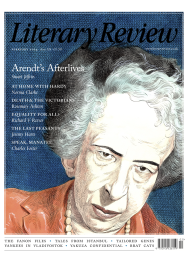Rana Mitter
Hard Times on the Yangtze
The Price of Collapse: The Little Ice Age and the Fall of Ming China
By Timothy Brook
Princeton University Press 256pp £25
Price rises can be a sign of political end times. I remember being in the USSR (as it still was, just) in the summer of 1991 and becoming aware that a fistful of soiled rouble notes would buy very little compared to a few crisp green US dollars. A half-century previously, the Chinese who lived through the revolution of 1949 also saw price rises as a clear indication that their world was falling apart. Relentless inflation made it unwise to buy a single train ticket as, after your stay, your remaining cash might not have enough value to cover the return leg and get you home.
The early 1640s, the dying days of the Ming dynasty in China, also saw a catastrophic spike in prices. That phenomenon underpins The Price of Collapse, whose author, Timothy Brook, is one of the most accomplished historians of a period that often lived up to the name of the ruling dynasty (ming means ‘brilliant’). There was little brilliant about its final years, however. Brook cites a memoir written by Chen Qide, an obscure local teacher who lived a hundred kilometres from modern Shanghai, to show how bad things had become. Chen recalled his early life as being one of (mostly) peace and prosperity, but the tide really turned with a terrible drought in 1641. ‘The vast majority had to get by on one meal a day,’ he observed, adding, ‘Oh, the people’s poverty was extreme.’ Above all, it was rising prices that caught his attention: the cost of pigs, chickens and beans all shot up. By the following year, even rice was running out. It was impossible to place a price on it because it was not available in the market.
Why did the disaster happen? Brook turns to two distinct fields of history to propose an answer: the history of prices and the history of the environment. He argues that climate change was a major but underexamined factor in the downfall of the Ming dynasty. The final episode in the

Sign Up to our newsletter
Receive free articles, highlights from the archive, news, details of prizes, and much more.@Lit_Review
Follow Literary Review on Twitter
Twitter Feed
Few writers have been so eagerly mythologised as Katherine Mansfield. The short, brilliant life, the doomed love affairs, the sickly genius have together blurred the woman behind the work.
Sophie Oliver looks to Mansfield's stories for answers.
Sophie Oliver - Restless Soul
Sophie Oliver: Restless Soul - Katherine Mansfield: A Hidden Life by Gerri Kimber
literaryreview.co.uk
Literary Review is seeking an editorial intern.
Though Jean-Michel Basquiat was a sensation in his lifetime, it was thirty years after his death that one of his pieces fetched a record price of $110.5 million.
Stephen Smith explores the artist's starry afterlife.
Stephen Smith - Paint Fast, Die Young
Stephen Smith: Paint Fast, Die Young - Jean-Michel Basquiat: The Making of an Icon by Doug Woodham
literaryreview.co.uk